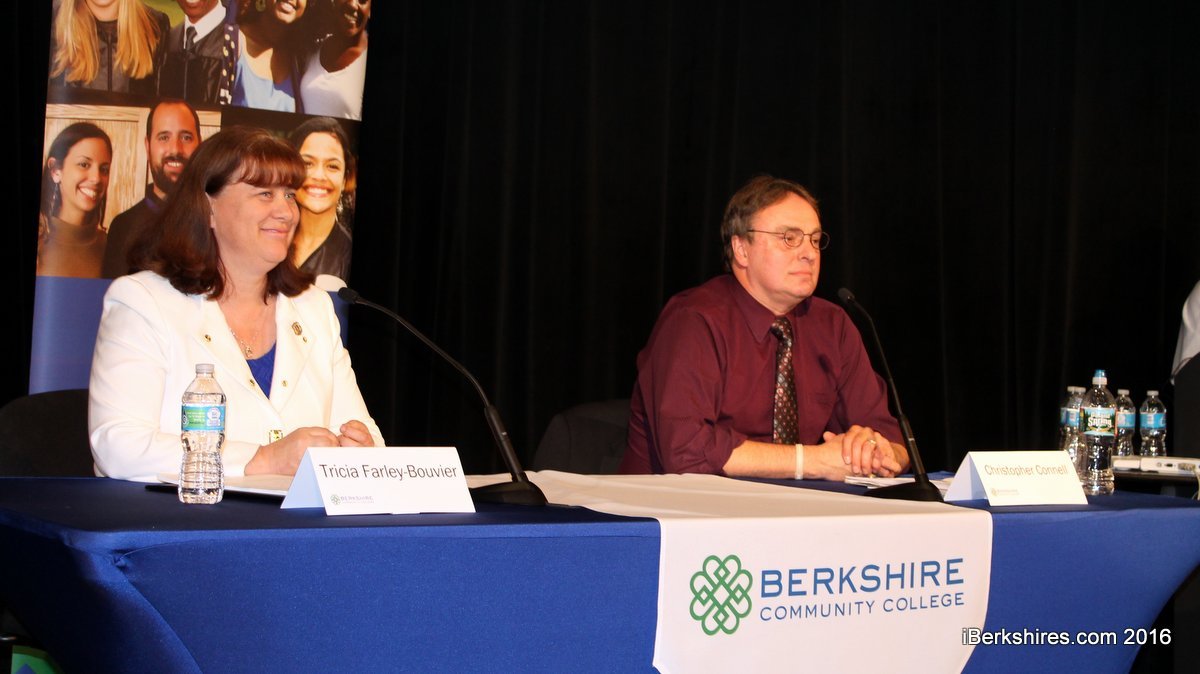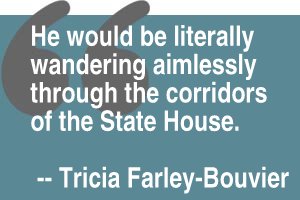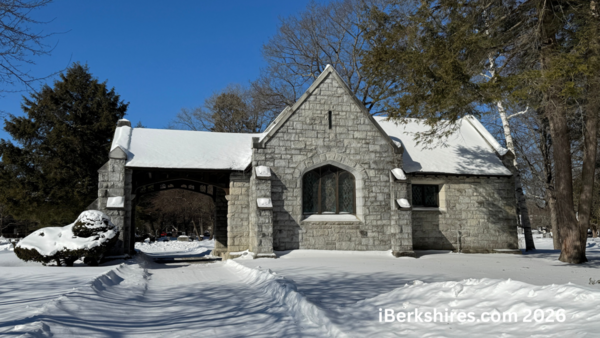

Connell, Farley-Bouvier Trade Barbs in State Rep. Debate
PITTSFIELD, Mass. — Christopher Connell wants people to think of the "three Ps" when it comes to his campaign for state representative: "performance, priorities, and Pittsfield."
But, incumbent Tricia Farley-Bouvier added one more: part time.
The two are seeking the 3rd Berkshire House of Representatives seat and at a debate Monday night put on by the Pittsfield Gazette and Berkshire Community College, the two didn't pull punches during the nearly hour discussion.
Connell closed with shots at Farley-Bouvier's record and she fired back saying Connell lacked an understanding of the how system works, and would only be serving part time if he sticks with his plan to also represent Ward 4 on the City Council.
"In her five years in office, she's passed only one piece of legislation that she has sponsored. Ironically, that was just last week in an election year. That represents one out of 26 bills. If she were a baseball player, she would have been benched by now," Connell said.
Beyond that, the three-term councilor said two of the bills she had sponsored have "serious consequences" to the people of Pittsfield. One would make veterans agents employees of the state, leading to the consolidation to just 25 locations for veterans to travel to get services. The other was a pilot for vehicle-miles traveled tax, which would replace the gas tax for one on the number of miles residents drive. Connell said the latter bill would mean in the tax would fall more heavily on the rural Berkshires because of its lack of public transit.
"Is this true representation? I don't think so. It is very clear we need a change in leadership," Connell said.
The Democrat Farley-Bouvier had her own shots, targeting Connell's decision not to run with an affiliated party. Connell says he chose to run independently to represent the people of Pittsfield. But Farley-Bouvier says that without a party affiliation, nothing can be accomplished — including getting office space on Beacon Hill. Farley-Bouvier said that decision just shows that Connell doesn't understand how things work in the State House.
"Without party leadership, you literally don't have someone to assign you to an office. Who is going to assign you to committees? How are you going to get funding, not through your party leadership because you don't have it? My opponent if elected, hopefully not for all of Pittsfield, he would be literally wandering aimlessly through the corridors of the State House," Farley-Bouvier said.
She also took issue with Connell's decision to stick with the City Council, saying it isn't possible to be both a full-time representative and a city councilor.

"My opponent wants to be a part-time state representative. He has said publicly, repeatedly, that he is going to stay on the City Council. Working on the City Council and as a state rep is not possible unless you want to be the rep who shows up on Wednesday afternoon to push your button to vote," said Farley-Bouvier, who has faced her first challengers since winning seat in a 2011 special election.
Farley-Bouvier's campaign has her own three principles: accessibility, advocacy, and collaboration. She said once taking office, she made sure she opened a full-time office in downtown Pittsfield to ensure she is accessible to the residents, which is something not all legislators do.
When it comes to collaboration, she used the terms she's been using for months now, "Team Pittsfield." She said she works with the mayor, superintendent, City Council, School Committee, business and cultural leaders and the residents to accomplish things in the Pittsfield-bound district. Other teams include the Progressive and the Gateway Cities caucuses, both of which she was able to use to get legislation passed.
For advocacy, she said the job entails advocating for the people and their desires and needs. One example of that advocacy came with the passage of a bill that now requires the state to hold rape kits for 15 years, up from what was just six months.
"It was done because we were able to work together," Farley-Bouvier said.
Connell said the city needs more funding from the state and that is why he is running. Pittsfield is approaching its tax ceiling, limiting the amount of revenue that can be raised locally, and he wants to earmark more money to help with city projects that the local budget doesn't have the ability to fund. Those projects he is eyeing the Columbus Street garage, the Bel-Air Dam, and the Berkshire Innovation Center.
Connell said, of the Columbus Street garage, "we still have a shortfall there. We need to have that done to support our downtown."
The Bel-Air Dam, which Connell recently held a press conference to highlight, is a high hazard with significant risk to life and property that has "been pushed to the side." He added that Farley-Bouvier was the director of administration for the city under former Mayor James Ruberto when the city was first informed about the level of risk. Lastly, Connell said the Berkshire Innovation Center, a planned life sciences incubator at the William Stanley Business Park, needs the funding because he doesn't want to see the project scaled back.
"Mrs. Bouvier has not brought these funds back to Pittsfield," he said.
Connell said state Rep. Paul Mark, D-Peru, was able to secure $250,000 for the Franklin County Development Corp., $100,000 for a senior center in Greenfield, and $2.5 million for a pre-release center at the Berkshire County House of Correction. But, Farley-Bouvier can't say the same.
"We have brought a lot of funding for projects in the district," Farley-Bouvier responded.
The largest project, she said, is the building of the new Taconic High School, which she says addresses the No. 1 need of employers in providing a skilled workforce. She also pointed to the turf field project at Berkshire Community College, the renovation of the First Street Common, the Greening the Gateway Cities program to plant hundreds of trees throughout the city, and funds to complete the renovation of North Street.
"We were able to bring millions of dollars into the district," she said, adding that the "real money" comes from strong teamwork, which she says she's been able to foster.
Farley-Bouvier also expressed her desire to secure money for the Columbus Avenue garage, which she said is the "No. 1 thing I am hearing from the mayor and our team." That project is expected to help increase market-rate housing downtown as well as Hotel on North. She said she is in the process of working toward getting funding for the Berkshire Innovation Center as well.
But she says there are still a number of areas the state is underfunding. She says the transportation infrastructure and public transportation is short on funds. There needs to be more money for the Department of Children and Families. And, "we are absolutely underfunding our education system."
She says the state has a revenue shortage and to address that she supports such changes to the taxing system as what is knowns as the "millionaire's tax" or the fair share amendment. That would place a surcharge of 4 percent on incomes over $1 million. Farley-Bouvier also supported the decision not to have a tax-free weekend this year to save from having to cut some $25 million from vital state programs.
"This year it wasn't a good idea," she said, adding that the revenue issues facing the state are leading to so-called executive 9C cuts in such programs as opioid abuse prevention and recovery.

Connell says in 20 years in the private sector, he has never walked into an operation and not found ways to cut on expenses. And he expects to the do the same with the state budget.
"Let somebody go to Boston as a state rep who has business experience," he said, asking for the chance to "look at the numbers."
As for the tax-free weekend, he said some businesses are reporting revenues down by some 20 percent because of the lack of the weekend. He said to help small businesses, there should be at least one day of tax-free sales. But, he hopes that isn't even an issue in the future.
"It comes down to we need to look at the whole budget and not just one program," Connell said.
Connell suggested some other changes to the state's funding such as increasing the weight of roadway mileage for Chapter 90 aid, which is for roads and sidewalks. He said now 58 percent of how much funding a city or town gets is based on roadway mileage while the other 42 percent is derived from employment and population figures, which he says hurts Pittsfield. He also would like to stop allowing cities and towns to buy equipment with those funds when equipment is only used for a few months each year and could instead be leased.
"It should be going to the blacktop on your road," Connell said.
He'd also like to see more weight in school funding go to towns with higher poverty rates because there is a whole host of issues that come with educating lower-income students. He said the city of Pittsfield spent more than $1 million on behavior adjustment counselors last year, something other towns don't have to deal with.
While Farley-Bouvier does want more revenue, she is skeptical of the ballot question to allow more gambling slot parlors in the state. She said that was put on the ballot by somebody who wants to build one in Revere and shouldn't be allowed.
Connell, however, says it should be. He was in Rhode Island when Foxwoods Casinos was built and he said the casino didn't bring in the crime issues others had warned about. Instead, he saw vacant lots being built up and soon Mohegan Sun was built. He said expanding gambling would create more jobs and more revenue.
Both candidates oppose the ballot question on raising the cap on charter schools. The ballot question would allow a dozen more charter schools to open. Both Farley-Bouvier and Connell said the charter schools pull too much from the district.
"We were supposed to learn from that experiment, but not at the expense of our schools," Connell said.
Connell praised the work of the city's teachers and administration but doesn't like the amount of funds that are lost because of students opting to go elsewhere.
Though in a very audible whisper heard throughout the BCC auditorium, one spectator felt that money was being lost because "we have lousy schools."
Farley-Bouvier said the charter school question is being pushed by New York hedge funds looking to "siphon off tax dollars" from school districts. Further, she said expanding the cap would hurt the county's only existing charter school because likely a new on would open in Pittsfield, from which Berkshire Arts & Technology Public Charter School gets much of its enrollment.
"It is the way they are funded which is bad," she said.
In a question about the move to all-electronic tolling on the Massachusetts Turnpike, Farley-Bouvier promised to serve in a constituent service role as the switch is made at the end of the week. She said there are some problems with the vendor chosen to implement it and she wanted to ensure any resident who has an issue to contact her office.
"Overall this is a good program but we have some glitches," she said.
Farley-Bouvier also said she was able to get a waiver clause in place in which if somebody does use the pay-by-plate option, the additional fees incurred could be forgiven if they sign up for the transponder. This is particularly important to people in the Berkshires who would be hit with even more charges than elsewhere because of the distance traveled to get to the eastern part of the state.
Connell supports the program saying it will save the state money. However, he feels "we jumped the gun." He would like to see a waiver of all tolls for six months or so as the kinks in the program gets worked out.
Neither candidate is taking a stance on the proposed Walmart Supercenter at the business park. Connell says the developer, Waterstone Realty, has said it was going to clean the site, correct the stormwater runoff issue, and reconfigure the intersections. But, until the company puts that in writing, Connell won't be in favor of it.
"If they put it on paper, I may go along for it," Connell said. "The only thing growing over there is weeds."
Farley-Bouvier said she has no role in it but "I support the process." She says she will be asking probing questions and helping to make sure all questions are answered for the city's residents who will be impacted by the local decision. She said she will also weigh in on the design to make sure it fits within the community.
"We don't want to create Allendale or Berkshire Crossing and plop it on Tyler Street," she said.
Early voting has already started for the first time in the state's history so residents can go to City Hall and vote during business hours and on Saturday morning. Otherwise, the polls will be open on Nov. 8.
Tags: debate, election 2016, State House, third berkshire,
















